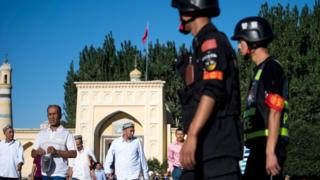Xinjiang police ‘monitor citizens by app’
Chinese police are using a mobile app to keep data on millions of ethnic Uighurs in Xinjiang province, according to Human Rights Watch (HRW).
In a report released on Thursday, HRW said it had reverse engineered the app to see how mass surveillance worked.
The app is used to closely monitor behaviours, it said, including lack of socialising, using too much electricity or having acquaintances abroad.
Rights groups say Uighur Muslims are being severely persecuted in China.
The UN has said there are credible reports up to a million Uighurs are being held in detention in Xinjiang, in what China says are “re-education centres”.
‘Most intrusive surveillance system’
According to the rights group’s report, the app is used by officials to record and file away information about people.
In particular, it targets “36 person types” that authorities should pay attention to.
These include people who seldom use their front door, use an abnormal amount of electricity and those that have gone on Hajj – an Islamic pilgrimage – without state authorisation.
The report does not make explicit mention of any ethnic groups specifically targeted, but the “36 person types” include “unofficial” imams – Islamic leaders – and those who follow Wahhabism, an Islamic doctrine.
The information taken from the app will be fed into the central system of the Integrated Joint Operations Platform (IJOP) – the main system for mass surveillance in Xinjiang, says HRW.
HRW senior China researcher Maya Wang said IJOP was “one of the world’s most intrusive mass surveillance systems”.
“It gathers information from checkpoints on the street, gas stations, schools… pulls information from these facilities and monitors them for ‘unusual’ behaviour that triggers alerts [to the]authorities.”
The app was obtained and analysed by HRW in partnership with Cure53, a Berlin-based security firm.
As well as its Xinjiang operations, China has 170 million CCTV cameras in place across the country and by the end of 2020, an estimated 400 million new ones will be installed.
All this is part of China’s aim to build what it calls “the world’s biggest camera surveillance network”.
China’s also setting up a “social credit” system that is meant to keep score of the conduct and public interactions of all its citizens.
The aim is that by 2020, everyone in China will be enrolled in a vast national database that compiles fiscal and government information, including minor traffic violations, and distils it into a single number – ranking each citizen.
China’s detention camps
Xinjiang is a semi-autonomous region and in theory at least, has a degree of self-governance away from Beijing.
The Uighurs, a mostly Muslim ethnic minority, make up around 45% of its population.
HRW’s report comes as China faces increasing scrutiny over its treatment of them and other minorities in Xinjiang.
Up to one million Uighurs are being held in detention camps across Xinjiang, a UN human rights committee heard last year.
One member said she was concerned by reports that Beijing had “turned the Uighur autonomous region into something that resembles a massive internment camp”.
A BBC investigation last year revealed that what appear to be “large prison-type structures” have been built across Xinjiang in the past few years.
China says these buildings are “vocational training centres” used to educate and integrate Muslim Uighurs and steer them away from separatism and extremism.
A Chinese Foreign Ministry spokeswoman, Hua Chunying, said, “everyone can see that people of all ethnicities in Xinjiang live and work in peace and contentment and enjoy peaceful and progressing lives”.
Source: Read Full Article




